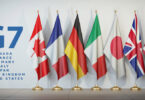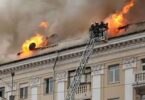Thomas Kaplan, Ian Austen and Selam Gebrekidan
WASHINGTON: After days of mounting pressure, the United States grounded Boeing’s 737 Max aircraft on Wednesday, reversing an earlier decision in which American regulators said the planes could keep flying after a deadly crash in Ethiopia.
The decision, announced by President Trump, followed determinations by safety regulators in some 42 countries to ban flights by the jets, which are now grounded worldwide. Pilots, flight attendants, consumers and politicians from both major parties had been agitating for the planes to be grounded in the United States. Despite the clamor, the Federal Aviation Administration had been resolute, saying on Tuesday that it had seen “no systemic performance issues” that would prompt it to halt flights of the jet.
The planes flew in similar erratic patterns, suggesting to experts that an automated system might have malfunctioned on both flights.
That changed Wednesday when, in relatively quick succession, Canadian and American aviation authorities said they were grounding the planes after newly available satellite-tracking data suggested similarities between Sunday’s crash in Ethiopia and one involving a Boeing 737 Max 8 in Indonesia in October.
“The safety of the American people and all people is our paramount concern,” Mr. Trump told reporters in the White House in making the announcement.
The crash of Ethiopian Airlines Flight 302 took place just minutes after takeoff and killed all 157 people on board the jetliner, a 737 Max 8. The circumstances echoed an October accident in which a 737 Max 8 operated by Lion Air, an Indonesian carrier, crashed and killed 189 people.
Marc Garneau, Canada’s transport minister, said that data on the vertical path of the Ethiopian jet at takeoff and comparable data from the Lion Air crash showed similar “vertical fluctuations” and “oscillations.” Hours later, the F.A.A. also said its decision came after the investigation “developed new information from the wreckage concerning the aircraft’s configuration just after takeoff.”
“Taken together with newly refined data from satellite-based tracking of the aircraft’s flight path,” the F.A.A. said, the information indicated similarities between the Ethiopian and Indonesian crashes “that warrant further investigation of the possibility of a shared cause for the two incidents that needs to be better understood and addressed.”
“Since this accident occurred, we were resolute in our position that we would not take action until we had data to support taking action,” said Daniel K. Elwell, the F.A.A.’s acting administrator. “That data coalesced today, and we made the call.”
With Streaks of Gray Hair, Xi Jinping of China Breaks With Tradition
Earlier, Ethiopian Airlines said that one of two pilots on Sunday’s flight reported “flight-control problems” to air traffic controllers minutes before the plane crashed and told controllers that he wanted to turn back to Bole International Airport in Addis Ababa. The pilot was cleared to do so, three minutes before contact was lost with the cockpit, a spokesman for the airline said on Wednesday.
That disclosure suggests that a problem with the handling of the aircraft or the computerized flight-control system could have been a factor. There has been no suggestion so far of terrorism or other outside interference in the functioning of the aircraft, which was only a few months old.
Officials examining the Lion Air crash have raised the possibility that a new flight-control system could have contributed to that earlier accident.
Mr. Elwell at the F.A.A. cautioned that the investigation into the Ethiopian Airlines crash was incomplete. No determination as to its cause has been made, nor has any final determination been released for the Indonesian crash. The flight data and voice recorders, known as black boxes, in the Ethiopia disaster have been recovered and will be analyzed in France.
“We still have a lot to learn before we can say that they were the same cause and effect,” he said.
The accidents have put Boeing on the defensive. The low-cost airline Norwegian Air, which has one of the largest Max 8 fleets outside the United States, said it would seek compensation from the company because of the groundings.
The 737 Max is Boeing’s best-selling jet ever and is expected to be a major driver of profit, with more than 4,500 of the planes on order. The company’s shares have fallen about 11 percent this week.
“We are supporting this proactive step out of an abundance of caution,” Boeing’s chief executive, Dennis A. Muilenburg, said after the grounding was announced. “We are doing everything we can to understand the cause of the accidents in partnership with the investigators, deploy safety enhancements and help ensure this does not happen again.”
After the Indonesian crash, pilots’ unions complained that pilots had not been made aware of a change to the flight-control system on the Max that could automatically push the plane’s nose down in certain situations. That software change is believed to have played a role in the Lion Air crash and may have been a factor in the Ethiopia accident as well. Boeing is now planning to roll out a software update that has been in the works since the Indonesian crash.
The introduction of a consequential new flight-control feature without any requirement for pilot training is now drawing more scrutiny. Representative Peter A. DeFazio, Democrat of Oregon and the chairman of the House transportation committee, said in an interview that he planned to conduct an investigation into the F.A.A.’s certification of the 737 Max, with a focus on why the regulator did not require more substantial training for 737 pilots learning to fly the new version.
Mr. DeFazio said he expected to seek all relevant communications between Boeing and the F.A.A., among other documents, and was willing to use subpoena power if necessary. “This warrants vigorous investigation,” he said. “We’re going to get anything in writing there is to get.”
Airlines in the United States stood behind the planes up until the F.A.A.’s order, and even expressed confidence in the jets afterward. Southwest Airlines said in a statement that it had been in “constant contact” with the F.A.A. and Boeing since the Ethiopian Airlines crash and that it remained confident in the 737 Max aircraft after flying the planes for more than 88,000 hours over 41,000 flights without incident. American said, “We continue to have the utmost confidence in our fleet.” The groundings in the United States and elsewhere also affected Boeing’s Max 9 model, which United Airlines flies.
“I don’t want to hazard a guess,” Mr. Elwell said when asked how long the Boeing planes might be prohibited from flying. “My hope is that the F.A.A., the carriers, the manufacturer, that all parties will work very hard to make this grounding as short as possible so that these airplanes can get back up in the sky.”
On Tuesday morning, Boeing’s chief executive, Mr. Muilenburg, had called Mr. Trump to personally express his confidence in the safety of the jets, according to two people briefed on the conversation.
The brief call had already been in the works, but it happened to come shortly after Mr. Trump raised concerns that airplanes were becoming too complex to fly and therefore endangering passengers. “Pilots are no longer needed, but rather computer scientists from MIT,” he wrote on Twitter.
On Wednesday, Mr. Trump expressed admiration for Boeing even while announcing that its planes could not fly.
“Boeing is an incredible company,” he said. “They are working very, very hard right now and hopefully they’ll very quickly come up with the answer, but until they do, the planes are grounded.”
Courtesy: (nytimes.com)






